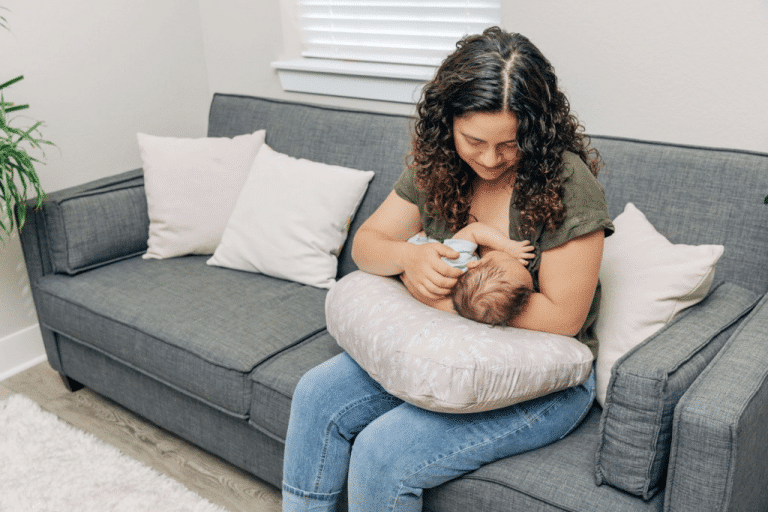At some point, every parent starts asking the same question: When will bedtime get easier?
You’re probably hoping for the day your baby starts sleeping earlier in the evening, giving you a bit of quiet before your own head hits the pillow.
In this post, I’ll walk you through when babies typically begin shifting to an earlier bedtime and what signs to look for along the way.
I’ll cover:
- Common age ranges for earlier sleep
- Why does bedtime suddenly change
- Tips to help guide the process
It’s about understanding your baby’s natural sleep patterns so you can work with them, not fight them.
If you’re feeling exhausted and craving a better evening rhythm, you’re in the right place. Let’s take a simple look at what really helps and when those earlier nights usually begin.
Signs Your Baby Is Ready for an Earlier Bedtime
Every baby is different, but there are a few common signs that can tell you it’s time to shift bedtime earlier. I’ll walk you through what I noticed with my own baby, so you can spot these changes too.
1. Getting Fussy in the Evening
If your baby starts crying or acting irritable earlier in the evening, that’s often a sign they’re overly tired.
I used to think fussiness just meant they were hungry or bored, but when it happened regularly around the same time, I realized they needed sleep.
A baby who’s too tired has a harder time falling asleep and staying asleep. By watching for that crankiness window and putting my baby down sooner, bedtime got easier and less stressful.
2. Waking Up More at Night
Frequent night wakings might mean your baby isn’t getting to bed at the right time.
I used to assume my baby just wasn’t a good sleeper, but then I learned that an overtired baby often wakes up more, even after falling asleep.
Once I shifted bedtime 30 minutes earlier, the night wakings dropped. Your baby may be too exhausted by the time they’re finally in bed, which can affect how deeply they sleep.
Earlier sleep helps the brain settle, which leads to longer, more restful stretches overnight.
3. Waking Up Too Early
It seems backward, but early wake-ups can sometimes mean your baby’s bedtime is too late.
When your baby goes to bed overtired, they might wake up before they’re fully rested. Try bumping bedtime earlier by 15–30 minutes and give it a few days.
That change alone helped my baby wake up at a more reasonable time. You might be surprised how much difference a small shift can make.
4. Taking Shorter Naps
Your baby’s naps and nighttime sleep are connected. I learned that when my baby went to bed too late, naps the next day were shorter and less restful.
A late bedtime can throw off their whole rhythm. You might notice your baby resisting naps or waking up from them cranky. That could be their body struggling to reset after a rough night.
Earlier bedtime helped me smooth out the whole day and made naps more consistent.
5. Showing Sleepy Cues Sooner
Pay attention to when your baby starts rubbing their eyes, yawning, or staring off quietly.
If you’re seeing those signs earlier than usual, bedtime might need adjusting. Once you notice those signals earlier in the evening, don’t wait; start the bedtime routine soon after.
Catching that sleep window can make all the difference. I found that my baby fell asleep faster and with less fuss when I followed their cues instead of the clock.
Effective Strategies to Encourage Earlier Sleep
Helping your baby shift to an earlier bedtime doesn’t have to be complicated. These tips are all about keeping things calm, consistent, and easy to follow.
1. Watch for Sleepy Cues
Start by paying attention to signs your baby is getting tired. I noticed eye rubbing, yawning, or quiet staring meant it was time to start winding down.
If you wait too long, they can get overtired and wired. That makes bedtime tougher.
As soon as you spot those signs, even if it feels early, start your bedtime routine. It helps your baby relax and fall asleep more easily.
2. Start the Routine 15 Minutes Earlier
You don’t need to shift bedtime all at once. Begin by moving your bedtime routine just 15 minutes earlier for a few nights.
Once my baby adjusted, I moved it earlier again. Slow, small changes work better than big ones.
It keeps your baby from getting overwhelmed. Stick to the same steps, bath, bottle, story, or whatever works for you. The key is being predictable and calm.
3. Get Daytime Sleep on Track
Daytime naps matter more than I thought. When my baby was overtired from skipping naps, nighttime sleep got harder.
A well-rested baby during the day usually sleeps better at night. Try to keep nap times fairly regular and avoid skipping them. If naps are all over the place, start by focusing on a consistent morning nap.
That one can help set the tone for the rest of the day.
4. Use Light to Guide Their Rhythm
Light helps your baby’s body understand when it’s time to be awake or asleep. I found that exposing my baby to natural sunlight in the morning made a big difference.
Then in the evening, I kept the lights low and avoided screens. Dim lighting sends a clear signal that bedtime is coming.
After a few days of doing this, falling asleep earlier started to come more naturally.
5. Avoid Too Much Stimulation Late in the Day
Too much excitement in the evening can keep your baby wired. I used to play active games close to bedtime and didn’t realize it made sleep harder.
Now I keep things calm and quiet after dinner, just cuddles, stories, or gentle music. This helps my baby settle down faster when it’s time for sleep.
Try skipping anything loud or over-stimulating in the hour before bedtime.
Overcoming Common Sleep Challenges
I’ve dealt with plenty of sleep struggles, and I know how frustrating they can be.
These are some of the most common issues I’ve seen, along with what usually causes them and what helped in my experience:
- Baby wakes up 30-45 minutes after falling asleep: This often happens when a baby finishes one sleep cycle and can’t settle into the next. Earlier bedtime or smoother wind-down helps with this.
- Fighting sleep at bedtime: If your baby resists bedtime, they may be overtired or overstimulated. Start looking for sleepy cues and avoid active play right before bed, which made a big difference.
- Short naps during the day: When naps only lasted 20–30 minutes, I realized the nap schedule wasn’t consistent enough. Creating a quiet nap routine helped stretch nap times.
- Early morning wakeups: Waking before 6 a.m. can be linked to a bedtime that’s too late or too much light in the room. I moved bedtime earlier and used blackout curtains to help.
- Waking frequently overnight: Frequent waking can be tied to hunger, teething, or needing help falling back asleep. I checked for those first, then worked on helping my baby learn to self-soothe.
- Skipping naps altogether: Some days, naps just didn’t happen, especially during regressions. Still, you can offer quiet time in a dark room to give my baby rest, even if they didn’t sleep.
When to Seek Professional Advice on Baby Sleep?
Sometimes, no matter what you try, sleep just doesn’t improve. I’ve been there, and it can be really frustrating.
If your baby is older than 6 months and still wakes up often, has a hard time falling asleep even with a routine, or shows signs of discomfort at night, it’s worth checking in with your pediatrician.
You should also ask for help if your baby isn’t gaining weight as expected, or if sleep issues are making daily life more stressful.
I’ve learned that reaching out early can make a big difference. A doctor or sleep consultant can rule out medical concerns and give you useful guidance.
It’s okay to ask questions and get support when things aren’t improving on their own.
Conclusion
know how hard it is when your baby’s bedtime feels like it’s always getting pushed later.
You’re tired, and you just want a little evening peace. The good news is that most babies start going to bed earlier around 3 to 6 months, though every baby is different.
If your little one seems ready, showing signs like longer naps or earlier wake-ups, you can start making gentle changes. Keep things consistent.
Stick to a calm routine. And don’t stress if it doesn’t happen overnight. Watch your baby’s cues, not the clock. That’s what helped me the most.
You don’t need to do it perfectly. You just need to keep trying. And if you ever feel unsure, talking to your pediatrician can give you some peace of mind.










